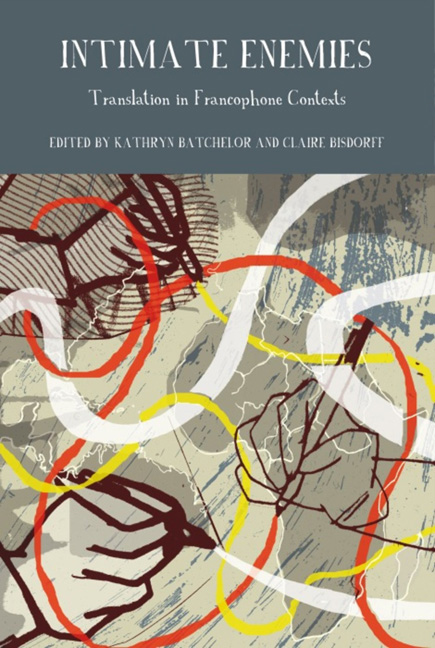Book contents
- Frontmatter
- Contents
- Illustration
- Acknowledgements
- Introduction: Translation – Formidable Enemy or Needed Friend?
- The Translation Market: Publishing and Distribution
- Writing and Translating in Practice
- Translation Challenges and New Avenues in Postcolonial Translation Theory
- Subverting Subversion? Translation Practice and Malpractice in the Work of Patrick Chamoiseau
- ‘Un art de la fugue’: Translating Glissant's Poetry, Fiction and Prose d'idées
- Postcolonial Intertextuality and Translation Explored through the Work of Alain Mabanckou
- Ananda Devi as Transcolonial Translator
- Translation and Current Trends in African Metropolitan Literature
- Notes on Contributors
- Index
‘Un art de la fugue’: Translating Glissant's Poetry, Fiction and Prose d'idées
from Translation Challenges and New Avenues in Postcolonial Translation Theory
- Frontmatter
- Contents
- Illustration
- Acknowledgements
- Introduction: Translation – Formidable Enemy or Needed Friend?
- The Translation Market: Publishing and Distribution
- Writing and Translating in Practice
- Translation Challenges and New Avenues in Postcolonial Translation Theory
- Subverting Subversion? Translation Practice and Malpractice in the Work of Patrick Chamoiseau
- ‘Un art de la fugue’: Translating Glissant's Poetry, Fiction and Prose d'idées
- Postcolonial Intertextuality and Translation Explored through the Work of Alain Mabanckou
- Ananda Devi as Transcolonial Translator
- Translation and Current Trends in African Metropolitan Literature
- Notes on Contributors
- Index
Summary
Introduction
Édouard Glissant's death in 2011 at the age of eighty-three ended a prolific and internationally acclaimed intellectual career. For more than half a century, he had been writing and publishing fiction, poetry, as well as critical and political works, striving to add to a growing literary tradition in the French Caribbean island of Martinique by lending his pen to a burgeoning collective consciousness and aiming to heal a complicated and difficult past through literary and artistic expression. His poetry, fiction and critical works form part of the same aesthetic mission: to give the French Caribbean a voice and to (re)create a collective memory for Martinicans. Whatever the genre of the work at hand, his style – digressive, sometimes obscure, with traces of oral voices – ‘performs’ the very concepts he describes. Consequently, the work of Glissant can be defined as ‘un ensemble d’îles, un archipel textuel où les œuvres communiquent et s'entrecroisent, où le métissage des genres littéraires se pratique avec bonheur’ (Joubert, 2005: 1). His own thinking on the role of language in the French Caribbean evolves from seeing the Antillean as a person who has no language, and needs to create and find a voice (Le discours antillais, 1981), to thinking about issues regarding the navigation of the multiplicity (Traité du tout-monde, 1997c) and the mixity of languages (Britton, 2008: 244–45). As he declares himself, ‘j'appelle cette pensée pensée archipélique, c'est-à-dire une pensée non systématique, inductive, explorant l'imprévu de la totalité-monde et accordant l’écriture à l'oralité et l'oralité à l’écriture’ (Glissant, 1996: 34).
In this chapter, I will discuss Glissant's work through the prism of translation, using the transfer from French to English as a critical tool to analyse his discourse. The discussion will include selected examples from all three genres of Glissant's output: from the translations in English of his early novels, La Lézarde (The Ripening) and Le Quatrième siècle (The Fourth Century), from the translations of his poetry and finishing with a short discussion of his critical prose d'idées, as translated by Michael Dash, Betsy Wing and Nathalie Stephens. Finding a way into language, into expression, forms a key theme to Glissant's work – and translation in itself is a continuation of this process.
- Type
- Chapter
- Information
- Intimate EnemiesTranslation in Francophone Contexts, pp. 181 - 195Publisher: Liverpool University PressPrint publication year: 2013



